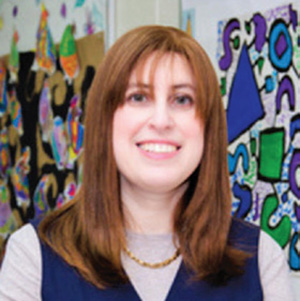
“What a phenomenon!” exclaims Binyamin, an eager sixth grade math student, connecting his new language of science to math. Truly, his words reverberate as RPRY begins a new year of excellence. Real-world phenomena frame not only the next generation science standards but fundamentally reset the approach to all learning. Scenarios and applications from everyday life and wonder fuel learning in an atmosphere of genuine curiosity, compassion and connection. All young children begin life as great wonderers—great scientists and great philosophers!
As we start a new Torah reading cycle on Simchat Torah, the deep narratives of Bereishit, with their storylines, tend to capture our imagination. However, it is also the parshiot in Devarim that resonate deeply with educators as the weeks lead into Rosh Hashanah, Yom Kippur and Sukkot. In many ways, the book of Devarim is the most emotional of all the five books of the Torah, as we hear the direct voice of Moshe, who led the Jewish people with tremendous empathy and emotional resonance for all of the people. Even the trope, the cantillation marks, for these parshiot is more dramatic and emotional than in the other four books. There are numerous quotes that speak to educators on multiple levels.
One overall theme is the idea that there will always be struggling people who are in need of deeper understanding and empathy. I heard from my father, Rabbi Reuven Stein, rav of Ohel Avraham Mishkan Yosef, in the name of his rebbe, Rav Yosef Dov Soloveichik, zt”l, about how Moshe Rabbeinu davened at the end of his life to enter Eretz Yisrael, but it never says that anyone else in the tzibbur also davened for Moshe. For all of Moshe’s support and empathy and leadership, for all of his students, no other human being stepped forward. No one else knew what was going on inside Moshe, only Hashem. Maybe the outcome would have still been the same, but if Moshe could have known that another human being was also with him, it might have felt different.
This is essentially the idea that David Hamelech shares, as well. The shoresh of shepherd also means friend. I always have Hashem’s friendship, I am not alone, even when I am going through terrible times, but the greatest fear, the worst suffering, is to be alone. Even one other person’s empathy makes a huge difference in a life.
Over the last several years, a metacognitive framework has become the bedrock of the educational vision at RPRY. Curious, compassionate and connected teachers and students are on a journey together to share in the setting of learning goals, and the development of self-monitoring, self-regulation and self-reflection.
Each year, teachers make small changes to their instruction that have outsized impacts on student growth. Two of many of these changes this school year entailed both the location and classroom layout of our lower school classrooms. Teachers planned carefully for the structure and seating in their classrooms to best promote a dynamic, flexible approach to instruction, emphasizing small group and individualized learning. Many classrooms now feature a sensory path in their nearby hallways.
Teachers strive to make an “invisible” aspect of the classroom culture visible to children. Teachers pay attention to the language that they use and how that impacts student understanding. Incorporating The Nurtured Heart Approach and using very clear language to support prosocial behaviors creates a positive learning environment for all students. Teachers encourage a community of kindness, patience and pleasant tones of voice.
Our school community thrives by capitalizing on our strengths. All students and teachers benefit from developing recognition of their strengths and how to best utilize them to promote a positive learning environment. This self-awareness allows students to eagerly engage in the learning struggle, accept learning from mistakes, activate grit and perseverance and use these and other strengths even in the face of challenges.
Our teachers are curious about how our students learn and take the time to find out what kind of learners they are and what interests them. Our teachers are compassionate and empathetic. They understand that children come to learning carrying their own personal narratives of themselves as learners. Our teachers are connected; they build relationships with their students through their honest curiosity about their learning and their genuine empathy for their students’ perspective. Together, RPRY teachers and students are writing the narrative of the next generation of RPRY learners.
To be human is to be a storyteller. Human beings seek to find meaning in their lives by making connections between events and links between people and generations to create a cohesive, livable story frame. Ultimately, we are all great storytellers about our very lives. These narratives we construct about our own lives inform our practices. There are the narratives adults construct about children that affect our relationships. There are the narratives that children construct about themselves, as human beings and as learners. There are the narratives that teachers and administrators create about students and/or classes. As teachers, administrators and Jewish leaders, connected to our children through our Torah mesorah, we must always be cognizant of the narratives we create, through a humble lens colored by empathy, curious and compassionate for the lives we support.
Chana Luchins is the principal of general studies at Rabbi Pesach Raymon Yeshiva. She is an educator with over 20 years of experience, working with students from early childhood through Grade 12, in both general and Judaic studies. She holds a master’s degree in special education from the Graduate School of Education at Touro College. She joined the RPRY family in 2008 and is a proud parent of four RPRY graduates, and one current student.










